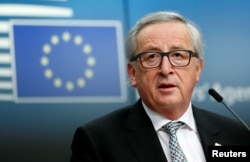“Absolutely unacceptable” were the words Canadian Prime Minister Justin Trudeau used to describe U.S. President Donald Trump’s statement that he plans to impose 25 percent tariffs on imported steel and 10 percent on imported aluminum products.
Trudeau made the comment Friday, adding that he is prepared to “defend Canadian industry.” Canada is the United States’ biggest foreign source of both materials. He warned that the tariffs would also hurt U.S. consumers and businesses by driving up prices.
The European Union was also stung by Trump’s plan, as evidenced by European Commission President Jean-Claude Juncker’s warning that the EU could respond by taxing quintessentially American-made products, such as bourbon whiskey, blue jeans and Harley-Davidson motorcycles.
Juncker told German media Friday that he does not like the words “trade war.” “But I can’t see how this isn’t part of warlike behavior,” he said.
Trump had tweeted earlier in the day: “Trade wars are good, and easy to win.”
The director of the World Trade Organization, Roberto Azevedo, responded coolly, saying, “A trade war is in no one’s interests.”
The currency market responded with a drop in the value of the U.S. dollar against most other major currencies. It ended the day at its lowest level against the yen in two years. The euro gained a half-percent against the dollar on Friday.
And the Dow Jones Industrial Average finished the trading week with its fourth decline in as many days, ending at 24,538.06. The Nasdaq and S&P 500, however, rose slightly after a three-day losing streak.
Trump spent Friday defending his threat to impose the tariffs, saying potential trade conflicts can be beneficial to the United States.
“When a country (USA) is losing many billions of dollars on trade with virtually every country it does business with, trade wars are good, and easy to win,” Trump wrote in a post on the social media site Twitter. “Example, when we are down $100 billion with a certain country and they get cute, don’t trade anymore — we win big. It’s easy!”
A Japanese government official told VOA that Tokyo “has explained several times to the U.S. government our concerns,” but declined to comment further on any ongoing discussions with Washington.
“While we are aware of the president’s statement, we understand that the official decision has not been made yet,” the Japanese official said. “If the U.S. is going to implement any measures, we expect the measures be WTO-rules consistent.”
China on Friday expressed “grave concern” about the matter.
Trump said Thursday the tariffs of 25 percent on steel and 10 percent on aluminum imports will be in effect for a long period of time. He said the measure will be signed "sometime next week."
In 2017, Canada, Brazil, South Korea and Mexico accounted for nearly half of all U.S. steel imports. That year, Chinese steel accounted for less than 2 percent of overall U.S. imports.
William Gallo, Fern Robinson, Wayne Lee contributed to this report








